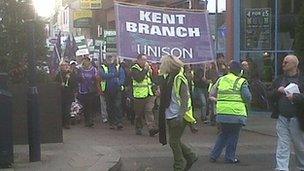Kent strike action 'hardest decision' in teachers' career
- Published

Teachers at the Maidstone protest said they were facing real damage to their incomes and retirement
Teachers on strike in Kent have said taking part in the national day of action has been one the "hardest decisions" they have had to make.
They have accused the government of carrying out a PR war against the public sector and failing to take part in meaningful talks to halt industrial action.
About 130 schools were fully closed in the county on Wednesday as staff gathered to take part in rallies including a march through the county town of Maidstone.
NASUWT representative and part-time teacher Julia Harris said: "I don't know what they [the government] are doing.
"We would have called for meaningful negotiation. But nothing happened. We got to the end. We got to that point."
'Social conscience'
Deputy head teacher of a primary school in Dartford, Martin McCusker said: "It's the hardest decision I have made in my career."
He said: "The government are castigating us and painting us in the role of 1970s militants.
"We have tried to negotiate. But they have made announcements in the press.
"It is a PR war. But deep down, they know what they are doing is wrong."
Prime Minister David Cameron has described the national strike as a "damp squib".
At Prime Minister's Questions, he said he thought the government had made a "very reasonable, very fair offer to public sector workers" and it had to make "responsible decisions".
But Jonathan Absalom, who is a Kent supply teacher, said he did not think the government had provided any evidence of the affordability of the pension scheme.
He said: "They are not negotiating. We have no choice but to take this action.
"People are reluctant to take this action. They have a conscience and they are committed teachers."
He added: "The job comes with a social conscience. You don't go into teaching unless you want to give something back to society."
And he said teachers were all professionals with primary degrees and post-graduate teaching qualifications who could have chosen to work in any industry they wanted.
But many newly qualified teachers left the profession within the first few years because of stress and workload.
Young teachers
He said it was estimated that 30% of newly qualified teachers left within the first five years.
Ms Harris said unions were concerned about young teachers who were in their 20s, had mortgages and wanted to start families.
She said it was feared they would not join the pension scheme and may leave the profession.
Mr McCusker said he and his wife, also a teacher, would have to pay an extra £400 a month between them under the proposed changes.
He said: "We have chosen a vocation. We love our jobs. But the government is relying on the public sector being a vocation."
He said teachers were facing real damage to their incomes and retirement but had proved they were prepared to stand up for themselves with the industrial action.
- Published30 November 2011
- Published30 November 2011
- Published30 November 2011
- Published1 December 2011
- Published1 December 2011
- Published10 September 2012